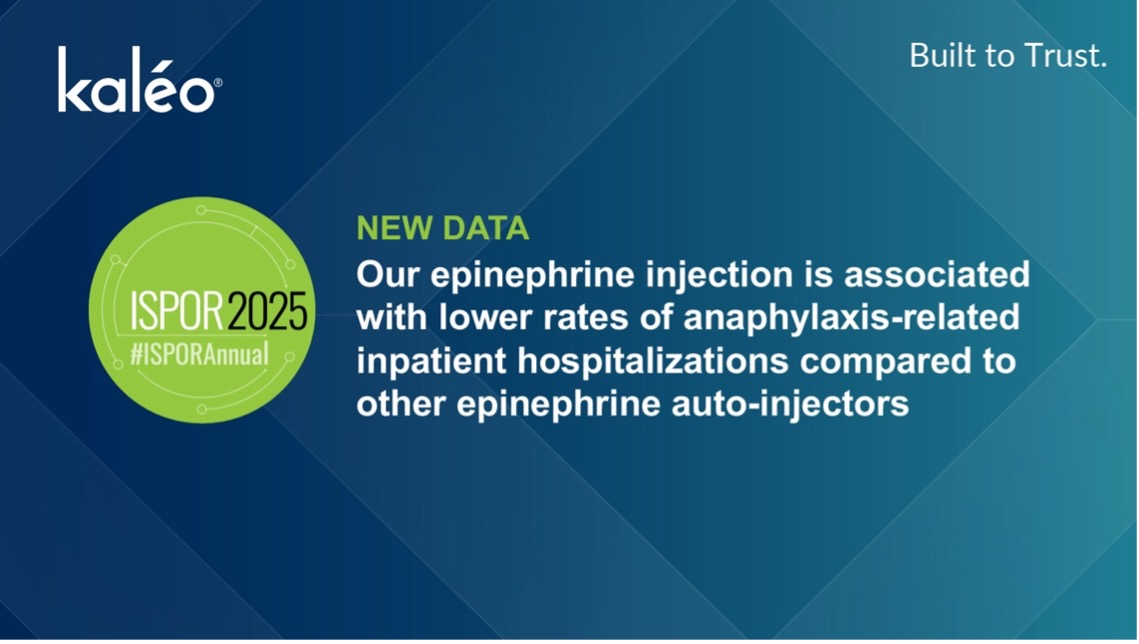News




Richmond, VA (May 15, 2025) – New findings from a retrospective analysis of U.S. commercial claims data indicate that patients prescribed AUVI-Q® (epinephrine injection, USP) experienced lower rates of inpatient hospitalization for anaphylaxis compared to patients prescribed other epinephrine auto-injectors (EAIs). The results are being presented during the ISPOR 2025 North America Conference, May 13–16, 2025, in Montreal, Quebec, Canada.
“AUVI-Q was designed to guide patients and caregivers through the administration of epinephrine in an allergic emergency,” said Rachael Griffiths, Director, Medical Affairs at Kaléo and study co-author. “These real-world data highlight that AUVI-Q may help patients by reducing the need for hospitalization after anaphylaxis.”
The study, conducted by researchers from ZRx Outcomes Research and Kaléo, evaluated data between January 1 and December 31, 2023. The analysis included 10,130 patients prescribed AUVI-Q and 52,094 patients prescribed other EAIs. Patients in the AUVI-Q cohort were generally younger (mean age 18.9 years vs. 28.5 years) and a greater proportion were male (52% vs. 45.7%) compared to the Other EAI cohort.
Key results include:
The study was presented as a poster titled “AUVI-Q (epinephrine, USP) vs. Other Epinephrine Auto-Injector Prescription Was Associated with Reduced Inpatient Hospitalizations for Anaphylaxis in a US Retrospective Commercial Claims Analysis” Wednesday, May 14th during the ISPOR 2025 poster sessions.
###
Indication
AUVI-Q® (epinephrine injection, USP) is a prescription medicine used to treat allergic reactions, including anaphylaxis, in people who are at risk for or have a history of serious allergic reactions.
Important Safety Information
AUVI-Q is for immediate self (or caregiver) administration and does not take the place of emergency medical care. Seek immediate medical treatment after using AUVI-Q. Each AUVI-Q contains a single dose of epinephrine. AUVI-Q should only be injected into your outer thigh, through clothing if necessary. If you inject a young child or infant with AUVI-Q, hold their leg firmly in place before and during the injection to prevent injuries. Do not inject AUVI-Q into any other part of your body, such as into veins, buttocks, fingers, toes, hands, or feet. If this occurs, seek immediate medical treatment and make sure to inform the healthcare provider of the location of the accidental injection. Only a healthcare provider should give additional doses of epinephrine if more than two doses are necessary for a single allergic emergency.
Rarely, patients who use AUVI-Q may develop infections at the injection site within a few days of an injection. Some of these infections can be serious. Call your healthcare provider right away if you have any of the following symptoms at an injection site: redness that does not go away, swelling, tenderness, or the area feels warm to the touch.
If you have certain medical conditions, or take certain medicines, your condition may get worse or you may have more or longer lasting side effects when you use AUVI-Q. Be sure to tell your healthcare provider about all the medicines you take, especially medicines for asthma. Also tell your healthcare provider about all of your medical conditions, especially if you have asthma, a history of depression, thyroid problems, Parkinson’s disease, diabetes, heart problems or high blood pressure, have any other medical conditions, are pregnant or plan to become pregnant, or are breastfeeding or plan to breastfeed. Epinephrine should be used with caution if you have heart disease or are taking certain medicines that can cause heart-related (cardiac) symptoms.
Common side effects include fast, irregular or ‘pounding’ heartbeat, sweating, shakiness, headache, paleness, feelings of over excitement, nervousness, or anxiety, weakness, dizziness, nausea and vomiting, or breathing problems. These side effects usually go away quickly, especially if you rest. Tell your healthcare provider if you have any side effect that bothers you or that does not go away.
Please see the full Prescribing Information and the Patient Information at www.auvi-q.com.
You are encouraged to report negative side effects of prescription drugs to the FDA. Visit www.fda.gov/medwatch or call 1-800-FDA-1088.
About Kaléo
Kaléo is a global leader in drug-delivery device technology and auto-injector innovation, providing millions of patients with security and peace of mind. Our patented Aerio™ platform, with unmatched capabilities and human factors engineering, powers our portfolio of auto-injector products, as well as products under development for third parties.
About AUVI-Q (0.3 mg, 0.15 mg and 0.1 mg)
AUVI-Q® (epinephrine injection, USP) is a prescription medicine used to treat emergency allergic reactions, including anaphylaxis, in people who are at risk for or who have a history of serious allergic reactions. AUVI-Q contains epinephrine, a first-line treatment for allergic reactions that occur as a result of exposure to allergens including food such as peanuts, tree nuts, fish, shellfish, dairy, eggs, soy and wheat; insect stings or bites; latex and medication, among other allergens and causes.
AUVI-Q is the only compact epinephrine auto-injector with a voice instruction system that helps guide patients and caregivers step-by-step through the injection process, and a needle that automatically retracts following administration. In anaphylaxis emergencies, it is often individuals without medical training who need to step in and deliver potentially life-saving epinephrine. AUVI-Q was designed through careful analysis of the situations where epinephrine auto-injectors are used and with significant input from the allergy community that relies on it, incorporating Human Factors Engineering (HFE). HFE is about designing products or systems that are easy to operate and, most importantly, support correct use, with the goal to remove the potential for error. For more information about AUVI-Q visit www.auvi-q.com.